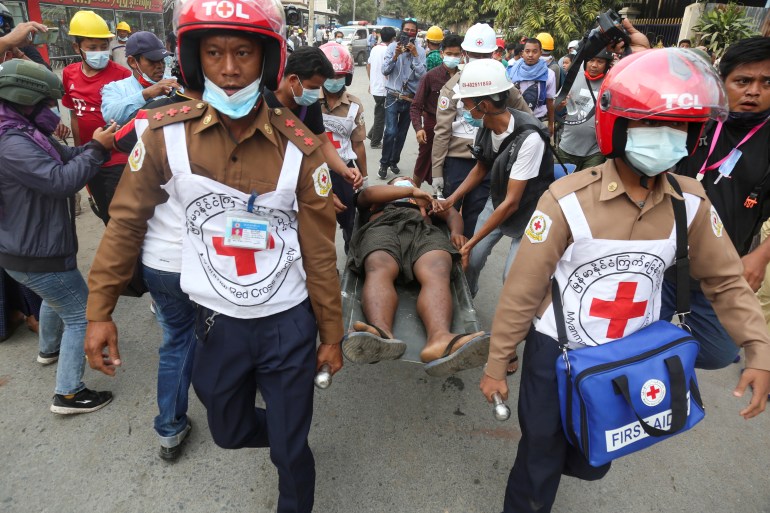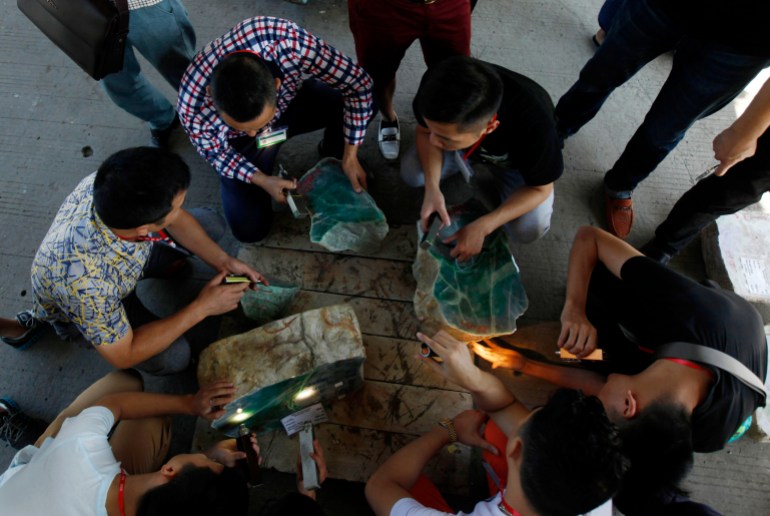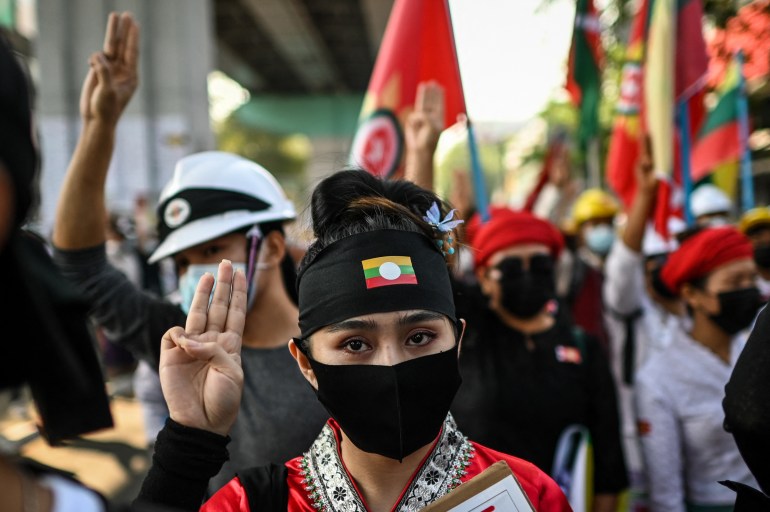Follow the money: Myanmar coup puts pressure on army businesses
Calls are growing for sanctions on the military’s vast business empire after the February 1 coup.

From SIM cards to beer, skydiving and jade mining, there are few areas of Myanmar’s economy that escape the long arm of its military, the Tatmadaw.
But after Senior General Min Aung Hlaing led a coup on February 1 that scuppered a 10-year experiment with democracy, campaigners have once again set their sights on the military’s sprawling, and highly lucrative, business interests.
Keep reading
list of 4 itemsProtests, sanctions, killings: The month since Myanmar’s coup
Malaysia deports 1,086 Myanmar nationals despite court order
US sanctions two more Myanmar generals after protest crackdown
“Min Aung Hlaing led a genocide against the Rohingya and the international response has been almost nothing really,” said Anna Roberts, executive director of the Burma Campaign UK. “He’s probably calculated that there will be a small response, but that it will be a price worth paying.”
Aung San Suu Kyi, and other senior members of the National League for Democracy (NLD), which won reelection in a landslide in November’s election, have been detained for more than three weeks with the military making unsubstantiated claims of fraud to justify its power grab.
The United States has already announced financial sanctions to prevent the military from tapping into billions of dollars deposited in the US, as well as targeted moves against individual generals including Min Aung Hlaing, adding to the measures imposed after the 2017 crackdown that prompted an exodus of more than 740,000 mostly Muslim Rohingya into neighbouring Bangladesh.
On Tuesday, after security forces used force to crack down on peaceful protesters killing two people, Washington added two more generals to its sanctions list.

But experts say the international community must go further than the individual generals and go after the armed forces’ extensive commercial activities.“By getting into business, the military has been able to gain a monopolistic control over key sectors of the economy,” Justice for Myanmar, an activist group, said in an emailed response to questions.
“During the NLD period, the military’s businesses empowered them and enabled their campaign of genocide, war crimes and crimes against humanity. The military is able to use funds from business to support military units, including those committing atrocity crimes, and it meant they were not reliant on the defence budget allocation from parliament.”
‘Massive theft’
The military began getting involved in business when Ne Win moved to nationalise the economy as part of his “Burmese way to Socialism in the wake of the 1962 coup.
As the military abandoned the planned economy, it began to nurture a form of crony capitalism with senior generals and military officers able to secure preferential access to many sectors of the economy, including some of the country’s most lucrative industries. In some areas, military companies and their affiliates were the only ones allowed to operate.
The process gathered momentum with the asset sales of 2011 when senior generals and their families were able to take advantage of the opening of the economy to secure control of some of Myanmar’s main assets.
“It’s really the elite and the business cronies who benefit from this massive theft of state resources,” Roberts said. “Rank and file soldiers don’t benefit, and obviously ordinary people suffer because money that that should be spent on health and education is being funnelled into buying military equipment instead.”
While the armed forces’ business interests remain largely a “black box” according to Clare Hammond, Global Witness’ London-based researcher on Myanmar, recent reports and document leaks have revealed more details of two giant conglomerates that are key to their wealth – Myanmar Economic Holdings Ltd (MEHL) and Myanmar Economic Corporation (MEC).

The Ministry of Defence established MEHL in April 1990 to “provide for the economic welfare for soldiers, war veterans, and the Burmese people, as well as to support the economic development of the state.”
The company “epitomizes the reach and breadth of the military’s domination over Burma’s economy,” the US Embassy said in a cable back in 2009 that recommended sanctions on MEHL, all its wholly-owned units, board members and general managers. “Its influence and holdings are key components of the elaborate system of patronage the regime uses to maintain power.”
Analysts say the military’s business clout remains significant even with the reforms of the past 10 years, and that the coup could be seen as an attempt to protect the military’s wealth and interests from potential reforms by the civilian government.
In 2019, the NLD managed to secure civilian control of the general administrative department, which oversees key bureaucratic appointments, and had also introduced changes to the law on gemstones and jade.
“Many were shocked that the military had been forced to relinquish control,” wrote Htwe Htwe Thein, an associate professor at Australia’s Curtin University, in an article published in The Conversation. “It was a sign of the weakening grip of the military over the government administration and patronage – which had been at the heart of its ability to accumulate and protect its wealth.”
Battalions of shareholders
The United Nations Fact-Finding Mission, set up in the wake of the Rohingya crackdown, detailed the military’s business interests in a 110-page report that was published in August 2019.
The report laid bare the extent of the armed forces’ involvement in the economy – exposing 106 MEHL and MEC-owned businesses as well as 27 close affiliates to the military – and the armed forces’ domination of Myanmar’s natural resources, including jade mining.
The Tatmadaw’s web of commercial interests enabled it to “insulate itself from accountability and oversight,” the UN said. “Through controlling its own business empire, the Tatmadaw can evade the accountability and oversight that normally arise from civilian oversight of military budgets.”
“The military’s tentacles spread across the board,” said Montse Ferrer, the business and human rights adviser at Amnesty International, which published a report last year estimating the military enjoyed dividends from MEHL alone of some $18bn (based on the official exchange rate of $1 to 6 Myanmar kyat) in the 20 years until 2011.

Amnesty, working from never-before-seen documents obtained by Justice for Myanmar, said that the conglomerate was not only controlled by the military’s top brass – the people who led the February 1 coup – but also the different wings of the armed forces – the army, the navy and the air force – and even combat battalions.
“It’s quite unique when you have a battalion that’s on the front lines and they are shareholders of MEHL,” Ferrer told Al Jazeera.
The Myanmar Centre for Responsible Business, which tracks transparency and standards of corporate governance in Myanmar through its annual Pwint Thit Sa report, said it had met 15 members of MEHL management in August last year to discuss its 3 percent score in the 2020 report.
They highlighted discrepancies in shareholdings, and the fact senior officers were not identified as politically exposed persons. MEHL, with which a number of foreign companies do business, told the MCRB that the company aimed to pay a 30 percent dividend and that institutional shareholders such as battalions spent their dividends on “welfare and not military purposes”.
The report noted that as of last November, MEHL had seven directors, and one alternate director, all of whom were active or retired military personnel. About one third of shares were held by battalions, with individuals owning the rest. The company’s constitution, it noted, also showed the existence of a “Guiding Board” – to oversee the Board – headed by Min Aung Hlaing.
The Pwint Thit Sa report, meanwhile, described MEC as a “military owned enterprise controlled by the Tatmadaw”, subject neither to civilian control, or the oversight of the auditor general.
MEC scored just 2 percent for transparency, underlining the challenges faced by anyone trying to understand or follow the military’s business dealings.

Following the money
Still, campaigners say efforts to identify military revenues – from legal and illicit sources – and investigate the way in which the military’s money passes through the global financial system must be stepped up in order for sanctions to work effectively.
“What we’re calling for in parallel with targeted sanctions is an effort by the countries imposing sanctions to investigate the revenue flows to the military and uncover the identities of unknown shareholders and the banks that have their money,” said Hammond. “That’s pretty crucial because we need to understand exactly where the military is making and keeping their money to effectively put pressure on those sources of funding.”
Others have also pointed to the military’s banking and financial links.
In a recent report on how the world should respond to the coup, Crisis Group stressed there could also be pressure on the military’s preferred financial centres in the Asian region “notably Singapore” including asset freezes and denying the generals’ financial services.
Campaigners have been pressing Kirin, the Japanese drinks company, to cut ties with MEHL for years. On February 5 it finally did so. Lim Kaling, co-founder of Singapore gaming company Razer, is also letting go of his one-third stake in RMH Singapore, which has a tobacco joint venture with the conglomerate, while on Thursday Facebook said it was banning all adverts from military-linked entities.
Myanmar people themselves are also boycotting goods and services from military companies.
For governments, it may also be time to get tough with Min Aung Hlaing and his generals.
“He feels he will get away with it,” Roberts said. “That’s why the international response needs to be strong; stronger than he was calculating.”
